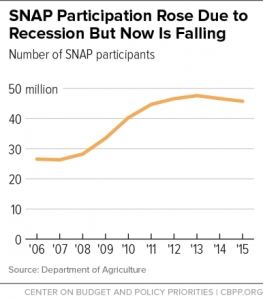
In today’s Wall Street Journal (gated) reports on a political battle over the provision of food stamps, and it illustrates much of what is wrong in Washington DC. Many of us lament the almost doubling of the number of people receiving food stamps, with only a slight drop off well after the recession is over. We legitimately worry about creating a culture of dependency which is not ultimately beneficial to the recipients. Yet there is an equal dependency on the provision of the goods the SNAP program funds, and crony capitalism is well at work here.
The battle is over the Obama administration’s latest salvo for public health.
U.S. regulators are pushing stricter rules for stores that accept food stamps, ultimately determining which retailers win and lose the billions of taxpayer dollars at stake. The proposal is throwing gas stations and corner stores into a battle with giants like Wal-Mart Stores Inc. and Kroger Co. over the $74 billion Supplemental Nutrition Assistance Program, or SNAP. By year end, the U.S. Department of Agriculture wants to adopt rules that require stores redeeming food stamps to stock a wider variety of meats and vegetables and sell fewer hot meals, like pizza.
There are competing claims for the SNAP $$, with small convenience stores on the losing end of the proposed rule. Standard public choice theory suggests that big businesses prefer regulation, since smaller competitors can’t afford the costs as well as the large firms. In this case, Walmart and Kroger already meet the standard–so even better from their perspective.
“We know that stores benefit from the revenue; that’s important to us,” said Kevin Concannon, USDA undersecretary for Food, Nutrition and Consumer Services, in an interview. “But we also believe that with the right to receive these taxpayer benefits for the food, that there ought to be just a basic minimum of healthy foods.”
Mr. Concannon notes the importance of the federal dollars going to business, but suggests it is not as important as providing healthy food for the poor. But why do regulations seemingly always support the politically connected at the expense of the politically weak?
Yet even more absurd is the idea that people want more fresh fruits and vegetables when they go to 7-11. While undoubtedly there are some people who don’t have access to a larger supermarket, and thus would benefit from having a broader selection, I suspect that most would not. And given that convenience store prices are already higher than larger stores, raising costs for perishable food that people don’t want is not going to work.
Al Patel, a manager at a Snappy Convenience Store in Chicago, said his customers use food stamps to buy chips and soda. Adding coolers with fresh meat probably won’t change that. “We tried that a long time ago,” but we didn’t sell much, he said.
Not to fear, our regulators
suggest stocking tofu and goats milk, which stores say people don’t want to and can’t afford to buy.
Really? Who eats tofu and goats milk? Only a regulator and Washington politicians would think that every convenience store should carry these things. As always, federal dollars create constituencies that argue for their continuation, and by implication, create demand for politicians that can help the program benefit these constituencies. This is yet another example of Ronald Reagan’s maxim:
Nothing lasts longer than a temporary government program
 Bert Wheeler
Bert Wheeler
 Jeff Haymond
Jeff Haymond
 Marc Clauson
Marc Clauson
 Mark Caleb Smith
Mark Caleb Smith
 Tom Mach
Tom Mach